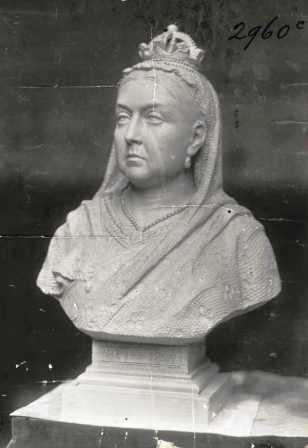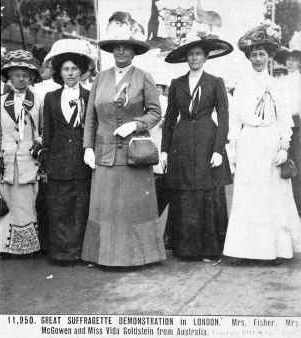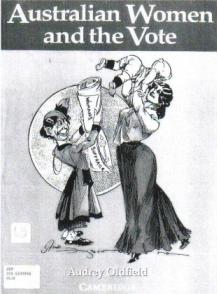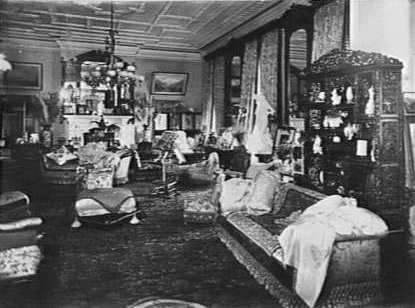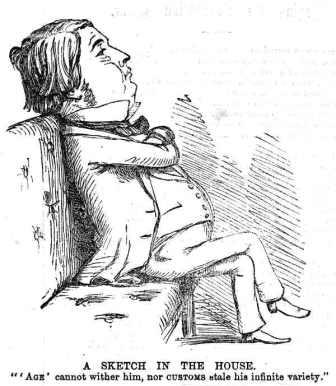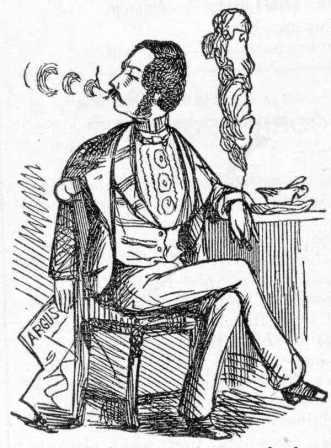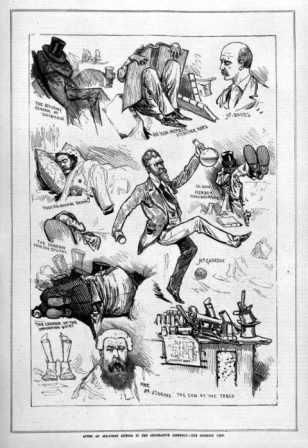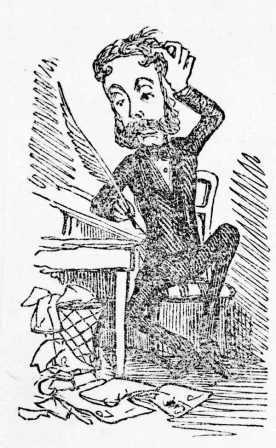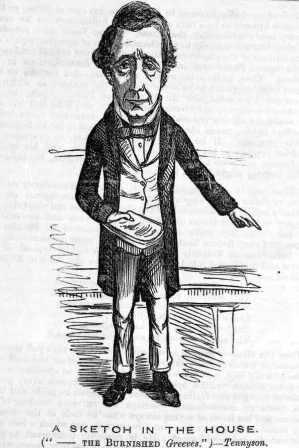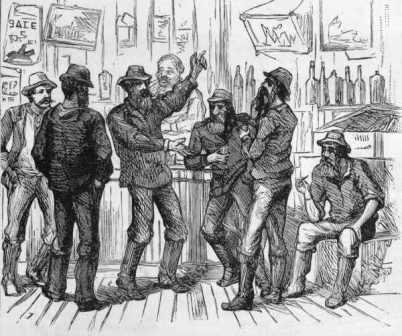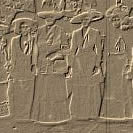 |
WOMEN WORKING TOGETHER |
THIS SITE CONTAINS
1 to 5 - Winning the vote
Chapter 1: The Vote or Bust 1788-1908
Chapter 2: Who Were the Suffragists?Chapter 3: 'United and Representative Agitation'
Chapter 4: Anti-Suffragists 1900-1910Chapter 5: Onwards to Success 1884-1908
6 to 10 - Social Justice and peace
Chapter 6: Moving into the Public World
Chapter 7: 1914-18 War - Pro Peace, Pro and Anti War
Chapter 8: Women's Work in WW1
Chapter 9: 1919-1935 - Surviving
Chapter 10: 1935-1945 Still Surviving
11 to 15 - Finding our voice as women
Chapter 11: 1945 and after - In Our Own Right
Chapter 12: 1970's Protesting - Working Together Again
Chapter 13: Finding Our Voice - Women's Liberation
Chapter 14: Working Collectively
Chapter 15: The 1970's & 80's Broader Women's Movement
16 to 20 - Our legacy our strength our struggle
Chapter 16: In Our Own Hands - Our Bodies
Chapter 17: Whose Right to Choose?- Our Selves
Chapter 18: Environment Matters
Chapter 19: 1990's When the Women's Movement is Quiet
Chapter 20: What a Legacy We Inherit!
Appendix 1: Papers and Interviews
Appendix 2: Songs from the Women's Movement
WOMEN FROM THE
WOMEN'S MOVEMENT
MENTIONED IN THIS WORK.
Abigail Adams
Ada Brougham
Adela Pankhurst
Adrian Howe
Agnes Murphy
Aileen Goldstein
Ailsa O'Connor
Alayne Park
Alex Butler
Alice B Toklas
Alice Henry
Alice Moon
Alice Suter
Alice Walker
Alice Weekes
Alina Holgate
Alisa Burns
Alison Alexander
Alison Dickie
Alison Richards
Alix McDonald
Alma Morton
Alma Thorpe
Andrea Coote
Annie McKenzie
Alva Geike
Amanda Bede
Amanda Biles
Amanda Graham
Amelia Ceranas
Amelia Lambrick
Amira Ingliss
Amy Castilla
Angelina Austin
Angelina Wonga
Ann Jackson
Anna Brennan
Anna Howie
Anna Morgan
Anna Pha
Anna Shaw
Anna Stewart
Anne Barker
Anne Carson
Anne Conlon
Anne Gowers
Anne Phelan
Anne Riseborough
Anne Stewart
Anne Summers
Annette Bear-Crawford
Annie Lister
Annie Lowe
Annie McKenzie
Anthea Hyslop
Antonie Stolle
Ariel Couchman
Audrey Oldfield
Barb Friday
Barbara Creed
Barbara Hall
Barbara Jones
Barbara Kerr
Barbara Marsh
Barbara Van Meurs
Barbara Wishart
Beatrice Faust
Bella Lavender
Belle McKenzie
Bertha Main
Beryl Carter
Bessie Harrison-Lee
Bessie Rainer Parkes
Bessie Rischbieth
Bette Olle
Betty Richmond
Bev Kingston
Bon Hull
Brettena Smyth
Brienne Callahan
Brigid McCaughey
Bronwyn Pike
Candy Broad
Carmel Shute
Carmen Callil
Carmen Lawrence
Carole Ford
Carole Wilson
Caroline Huidobro
Caroline Landale
Carolyn Allport
Carolyn Jay
Carolyn Worth
Carrie Chapman Catt
Carrie Reed
Caryl Friedman
Cath Mayes
Cath Stone
Catherine Anne Spence
Catherine Blackburn
Catherine McLennan
Cecilia John
Charlotte P Gilman (Stetson)
Cheris Kramarae
Cheryl Griffin
Chris Cathie
Chris Chapman
Chris Sitka
Chris Zsizsman
Christina Frankland
Christina Stead
Christine Haag
Churls Kramarae
Claire Berry
Clara Weekes
Clare Wright
Claudia Wright
Colleen Hartland
Constance Stone
Cynthis Carson
Dale Dowse
Dale Spender
Daphne Gollan
Deb Schnookal
Deborah Jordan
Deborah Wardley
Di Fruin
Di Otto
Di Surgey
Diane Crunden
Diane Kirby
Diane Sonnenberg
Dianne Edwards
Dianne Scott
Dianne Wells
Dimity Reed
Divna Devic
Dominica Whelan
Dora Coates
Doris Blackburn
Doris Challis
Doris McRae
Dorothy Turner
Dr Adrian Howe
Dr Aletta Jacobs
Dr Clara Stone
Dr Clare Isbister
Dr Constance Stone
Dr Helene Stocker
Dr Georgina Sweet
Dr Gwen Fong
Dr Janet Bacon
Dr Jocelynne Scutt
Dr Lyn McKenzie
Dr Marie Stopes
Dr Mary Glowrey
Dr Mary Stone
Dr Tamara McKean
Duggie Silins
Edie Turnevich
Edith Hedger
Edith Morgan
Edith Taylor
Edna Ryan
Eileen Capocchi
Eileen Kampukuta Brown
Eileen Unkari Crombie
Eleanor Dark
Eleanor Harding
Eleanor Hobbs
Eleanor M Moore
Elizabeth Cady Stanton
Elizabeth Coady
Elizabeth Hooke
Elizabeth Jackson
Elizabeth Ramsay-Laye
Elizabeth Reid
Elizabeth Rennick
Elizabeth Wallace
Elizabeth Wheelahan
Elizabeth Windshuttle
Ellen Julia Gould
Ellen Kleimaker
Ellen Ward
Elphinstone Dick
E McAllister
Emily Dobson
Emily Greene Balch
Emily Munyungka Austin
Emily Pankhurst
Emmaline Pankhurst
Emmy Evald
Ethel Barringer
Eugenie Davidson
Eva Eden
Eva Cox
Eva Figes
Eve Fesl
Eve Gray
Evelyn Gough
Evelyn Greig
Farley Kelly
Fiona Colin
Fiona Moorhead
Fleur Finney
Flo Kennedy
Flora Eldershaw
Florence Kelly
Frances Fraser
Frances Kissling
Fraulein Von Heymann
Freda Durham
Freda Gamble
Freda Steinberg
Frida Kahlo
Florence Miller
Gay Harris
Gayle Tierney
Gaylene Sneadon
Geraldine Briggs
Geraldine Robertson
Georgina McEnroe
Germaine Greer
Gertrude Bussey
Gertrude Stein
Gill Alecto
Gillian Waite
Gina Lewis
Gisela Kaplan
Glen Tomasetti
Greta Pearce
Gudren Drewsen
Gwendolen Swinburne
Harriet Taylor Mill
Hazel Donelly
Heather Jeffcoat
Heather Osland
Helen Anderson
Helen Caldicott
Helen Dow
Helen Durham
Helen Palmer
Helen Reddy
Helen Robertson
Helen Shardey
Helen Sexton
Hellen Cooke
Henrietta Dugdale
Henry Handel Richardson
Hetty Gilbert
Ilka Elkemann
Ina Higgins
Irina Dunn
Isabel McCorkindale
Isabella Goldstein
Isabella Martinis
Ivy Makinta Stewart
Jaala Pulford
Jacinta Allen
Jackie Fristacky
Jacqui Katona
Jan Armstrong Cohn
Jan Bassett
Jan Harper
Jan Mercer
Jan Testro
Jane Addams
Jane Alley
Jane Greig
Jane Mullett
Janet Bacon
Janet Bell
Janet Elefmiotis
Janet Lindsay Greig
Janet McCalman
Janet Michie
Janet Strong
Janey Stone
Janice Brownfoot
Janice Munt
Janine Bourke
Janne Reed
Jean Bedford
Jean Daley
Jean Henry
Jean McLean
Jean Melzer
Jean Sims
Jean Taylor
Jean Thompson
Jeanette Fenelon
Jeanette Powell
Jeanette Rankin
Jeni Thornley
Jennifer Clark
Jennifer Feeney
Jennifer Lee
Jennie Baines
Jenny Bacon
Jenny Barwell
Jenny Lee
Jenny Mikakos
Jenny Rimmer
Jenny Tatchell
Jesse Marlow
Jessie Ferguson
Jessie Henderson
Jessie Mcleod
Jessie Street
Jenny Pausaker
Jessie Street
Jessie Taylor
Jill Jolliffe
Jill Parkes
Jill Reichstein
Jill Roe
Jo Ellis
Jo MacLaine-Cross
Jo Phillips
Jo Wainer
Joan Coxsedge
Joan Curlewis
Joan E Basquil
Joan Goodwin
Joan Elkington
Joan King
Joan Kirner
Joan Rosanove
Joan Rowlands
Joanna Rea
Joanne Duncan
Jocelyne Clarke
Joe Dolce
Josephine Butler
Josie Lee
Joy Damousi
Joyce Barry
Joyce Johnson
Joyce Nicholson
Joyce Stevens
Jude Perera
Judi Willis
Judith Smart
Judy Cassar
Judy Morton
Judy Power
Judy Maddigan
Judy Small
Julia Church
Julia So So
Julianne Fogarty
Julie McCrossin
Julie Shiels
Juliette Mitchell
Kamla Bhasin
Karen Bird
Karen Gillespie
Karen Milgram
Karen Overington
Karen Silkwood
Karina Veal
Kate Darian-Smith
Kate Gilmore
Kate Jennings
Kate Miller
Kath Williams
Katherine Mansfield
Katherine Suzannah Prichard
Kathie Gleeson
Kathie Sarachild
Kathleen Fitzpatrick
Kathleen Maltzahn
Kathryn Sutherland
Kathy Gill
Kathy Wilson
Katrina Veal
Kay Daniels
Kaye Darveniza
Kay Hamilton
Kay Hargreaves
Kay Setches
Kaz Cooke
Keitha Carter
Kerry Blundell
Kerryn & Jenny
Kris Wilkinson
Lady Helen Munro-Ferguson
Lariane Fonseca
Laura Daniele
Laura Van Nooten
Laurie Bebbington
Lena McEwan
Lesbia Harford
Lesley Hewitt
Lesley Podesta
Lesley Stern
Lesley Vick
Leslie Cannold
Leslie Henderson
Lexie Methereall
Libby Brook
Libby Minifie
Lilian Alexander
Lilian Wald
Lily D'Ambrosia
Linda Aarchen
Linda Rubenstein
Linn Van Hek
Lisa Neville
Lisa Shuckroon
Liz Beattie
Liz Byrski
Liz Dowling
Liz Taylor
Lois Bryson
Lois Young
Lorri Manning
Louisa Lawson
Louisa Remedios
Louise Asher
Louise Walford
Lorna Scarles
Lucy Kowing Wilton
Lucy Paling
Lydia Becker
Lyla Barnard
Lyn Chambers
Lyn Hovey
Lyn McKenzie
Lynne Kosky
Mabel Drummond
Mandy Paul
Maree Gladwin
Margaret Bevege
Margaret Baskerville
Margaret Geddes
Margaret James
Margaret Mead
Margaret McKenzie
Margaret McLean
Margaret Roadknight
Margaret Thorp
Margaret Tims
Margaret Tucker
Margot Oliver
Maree Gould
Maria Mies
Marian Sawer
Marian Simms
Marian Vickers
Marie Kirk
Marie McInnes
Marie Rowan
Marion Harper
Marilyn Beaumont
Marilyn Hillgrave
Marilyn Lake
Marsha Thomson
Marylin Waring
Marilyn Wise
Marj Oke
Marjorie Barnard
Marjorie Barrett
Marjorie Waters
Mary Astell
Mary Bartlett
Mary Brodney
Mary Crooks
Mary Fullerton
Mary Gilbert
Mary Grant
Mary Killury
Mary Leigh
Mary Merkenich
Mary Murnane
Mary Owen
Mary Page Stone
Mary Rogers
Mary Salce
Mary Wolstonecraft
Mary Wooldridge
Matron Brown
Maxine Morand
May Brodney
May Langbridge
May Scheidt
May Smith
Megan McMurchy
Melanie Hall
Melinda Freyer
Melvina Ingram
Meredith Tax
Mesdames: Wallace; Baines;
Lavender; Webb; Singleton;
Morris; Gardiner; Reynolds,
Reid.
Mesdames Savage and Bella Lavender
Miles Franklin
Millicent Garrett Fawcett
Miss A Hume
Miss Anderson
Miss C H Thomson
Miss Cuthbertson
Miss D McRae
Miss E Goldstein
Miss E Hedger
Miss Effie Smart
Miss E Nesbit
Miss Geraldine Rede
Miss H Bridger
Miss H McGowan
Miss Harriet Newcomb
Miss Hilda Moody
Miss Jane Adams
Miss Janet Michie
Miss Jeanette Rankin
Miss Judd
Miss L Savage
Miss Lawler
Miss Lillian Locke
Miss Lillian Wald
Miss Mary Fullerton
Miss Miriam Geach
Miss Olive Gray
Miss R Smethurst
Miss Rapier
Miss Selina Cooper
Miss Simmons
Miss Wollen
Miss Stoddart
Miss V Bonner
Misses: Lewis; McMahon; Helsby;
Moody; Wise; Pascoe; Stewart;
Goodwin; Grant etc.
Misses: Mulcahy; Delaney; Townsend;
McGrath; Clements; Collins; Triffle; Cohen; McLean
Moira Rayner
Mollie Baine
Mollie Dyer
Molly Hadfield
Monika Wells
Morag Loh
Madame E Lorton Campbel
Mrs Anna B Howie
Mrs Bella Lavender Halloran
Mrs Beresford Jones
Mrs Bochinon
Mrs Brown
Mrs Catherine P Wallace
Mrs Chesterfield
Mrs Crawford
Mrs Crutchfield
Mrs D Irwin
Mrs D Monsbourgh
Mrs D Nankivell
Mrs Dwyer
Mrs E Hampton
Mrs E M Nimmo
Mrs E Pethridge
Mrs E Rothfield
Mrs Elliot
Mrs E W Nicholls
Mrs Emily Jackson
Mrs Evelyn Gough
Mrs F J Nicholls
Mrs F Williams
Mrs Florence Kelly
Mrs Fryer
Mrs Fisher
Mrs G Cameron
Mrs Goldstein (senior)
Mrs H A Dugdale
Mrs Harrard
Mrs Harrison Lee
Mrs Jamieson
Mrs Janet Strong
Mrs Jessie Vasey
Mrs Joan Rosanove
Mrs Josephine Butler
Mrs Kelly
Mrs Langdale
Mrs Laura Howie
Mrs Lister Watson
Mrs Lowe
Mrs Lucy Paling
Mrs M Hartley
Mrs M B Wollaston
Mrs M Mayall
Mrs Mabel Drummond
Mrs Malcolm
Mrs Martin
Mrs Mary Baird
Mrs Maudsley
Mrs M McGowan
Mrs Moody
Mrs Moore
Mrs Nance Wills
Mrs Naylor
Mrs O'Dowd
Mrs P Eden
Mrs Press
Mrs Pymm
Mrs Renwick
Mrs Robertson
Mrs Rosanov
'Mum' Shirl
Mrs Singleton
Mrs Smythe
Mrs Steele
Mrs Strong
Mrs Warren Kerr
Mrs Z Lees
Muriel Heagney
Myra Roper
Nan Chelsworth
Nancy Kessing
Nancye Smith
Narelle Dwyer
Nawal El Saadawi
Nettie Palmer
Nicole Steinke
Nina Bondarenke
Norma Grieve
Olive Gray
Olive Schreiner
Onnie Wilson
Pam Brewster
Pam Roberts
Pamela Branas
Pamela Curr
Pat Freeman
Pat Gowland
Pat Martin
Patricia Filar
Patsy Adam-Smith
Paula Trechler
Pauline Kennedy
Pauline Pickford
Peggy Cullinan
Penny Cooke
Penny Farrer
Penny Ryan
Peta Tait
Petra Munro
Philippa Hawker
Ponch Hawkes
Prof. Jo Wainer
Prof. Margaret Thornton
Rachel Avery
Rachel Hesley
Rae Walker
Raelene Frances
Ramona Koval
Rebecca West
Renate Howe
Renate Klein
Renee Miller
Renee Romeril
Rhoda Bell
Rigmor Berg
Rivka Pile
Roberta Meilleur
Robin Morgan
Robin Royce
Robyn Archer
Robyn Martin
Robyn Rowland
Romawati Senaga
Ros Bowden
Rose Scott
Rosemarie Gillespie
Rosemary Brown
Rosie Ferber
Ruby Rich
Ruby Tuesday
Ruth Bermann
Ruth Crow
Ruth Ford
Ruth Schnookal
Sabine Fernheicher
Sadie Kirsner
Sally Mendes
Sally Wilkins
Sandra Bloodworth
Sandra Onus
Senator Olive Zakharov
Sharon Jones
Sheila Bayard
Sheila Ricci
Sheila Wynn
Shirley Andrews
Shirley Swain
Sister Gladys Sumner
Sister Blake
Sister Brown
Sister Hannah
Sophie Slater
Stephanie Moore
Sue Jackson
Sue Mountford
Sue Pennicuik
Sue Reid
Sue Russell
Susan Anthony
Susan Hawthorne
Susie Grezik
Susy Potter
Suzane Fabian
Sylvia Azzopardi
Sylvia Plath
Sylvie Leber
Sylvie Shaw
Tammy Lobato
Tanya McIntyre
Teresa Magna
Terri Jackson
Terry Carney
Tess Lee-Ack
Tess Maloney
Thelma Fry
Thelma Lees
Thelma Prior
Thelma Solomon
Therese Radic
Theresa Lynch
Tjunmutja Myra Watson
Tjuta Ivy Makinti Stewart
Tracey Gurd
Tricia Caswell
Tricia Szirom
Trish Crick
Trudy Wise
Una Stannard
Val Ogden
Val Osborne
Vandana Shiva
Verity Bergmann
Vweronica Shwarz
Vida Goldstein
Virginia Geddes
Virginia Woolf
Vivien Brophy
Vivienne Binns
Wendy Lovell
Wendy Lowenstein
Wendy Poussard
Win Graham
Winsome McCaughey
Yolana Sutherland
Yosano Akiko
Yvonne Margarula
Yvonne Smith
Zara Wildenaur
Zelda D'Aprano
Zoe PhillipsThis work is copyright.
Please acknowledge the source/sources of anything you use.Every effort has been made to trace the people used on this site. Please contact us if you have any questions or concerns about our use of material.
Website advice:
Jean McConnachie
Editorial advice:
Barbara Hall, also Apsara Sabaratnam, Jean McConnachie, Irene Stavrakakis, Margaret Allison, Ramona Audrey, Waratah Rose Gillespie
Legal advice:
Matthew Nicholls
The forthcoming book is funded by Women's Web members and associates: Barbara Hall, Geraldine Robertson, Mary Crooks, Zelda D'Aprano
If you would like to contribute, please contact us.
CHAPTER 4 - Anti-Suffragists 1900-1910
Those who object to women entering Parliament should logically object to a woman occupying the exalted office of Sovereign. Else why should it be right for a woman to be Queen and wrong for her to be Member of Parliament?
Vida Goldstein
Queen Victoria miniature bust State Library of Victoria cc000524
In this chapter we look at the anti suffragists and anti-suffrage organisations active in the years before women won the vote in Victoria. First, women who were were anti-suffrage
1...WHO WERE THE ANTI-SUFFRAGISTS?
2...QUEEN VICTORIA
3...ORDINARY WOMENWe look at possible reasons
4...FEAR OF WOMEN'S VOTE
5...KING, COUNTRY, PURITY and ANTI-SOCIALISM and some of their campaigns and organisations, using bold type-face when quoting them
6...THE AUSTRALIAN WOMEN'S NATIONAL LEAGUE (AWNL)
7... EVA HUGHES
8...OTHER PATRIARCHAL OPPOSITION
such as
9...THE LIQUOR INDUSTRY
10..THE REACTONARY PRESSThere is a response to the suffragists 'Monster' petition made by the Victorian Masonic Journal then politicians' views on suffrage
11.. POLITICIANS' HURTFUL OPPOSITION
12..AND FROM HANSARD
13..MOTHERS, DAUGHTERS, WIVES?
14..FAMILY WITH A CAPITAL 'F'
15.. MANY ARGUMENTS WERE CLEARLY ABSURD
16.. DEBATE IN THE HOUSEWe finish with words from male politicians who supported suffrage
17.. PRO SUFFRAGE QUOTES FROM POLITICIANS1...WHO WERE THE ANTI-SUFFRAGISTS?
In Victoria votes for women and social justice issues were intertwined and often inseparable. Powerful forces and powerful people were organising to subvert and destroy the 'woman movement'.
2...QUEEN VICTORIA saw herself as an anti suffragist:Queen Victoria: 'The Queen is most anxious to enlist everyone who can speak or write to join in checking this mad, wicked folly of 'Woman's Rights,' with all its attendant horrors, on which her poor feeble sex is bent, forgetting every sense of womanly feeling and propriety. Lady ____ ought to get a GOOD WHIPPING.
It is a subject which makes the Queen so furious that she cannot contain herself. God created men and women different - - - then let them remain each in their own position. Tennyson has some beautiful lines on the difference of men and women in 'The Princess.' Woman would become the most hateful, heartless, and disgusting of human beings were she allowed to unsex herself; and where would be the protection which man was intended to give the weaker sex?' http://www.worldwideschool.org/library/books/hst/biography/Queen Victoria/chap42.html
3...ORDINARY WOMENOrdinary women who were anti suffrage are difficult to investigate. In Contemporary Writings on Women's Political Rights published in Victoria between 1880 and 1920, Penny Cook saw many anti-suffrage women as '... against women having a public life, which means they didn't appear on the public record much outside births, deaths and marriages. They seemed to be more active in the country than in the city. Many saw themselves as helpmates to husband, and by this doing the will of God. Some didn't want the responsibility.' State LIbrary of Victoria
4...FEAR OF WOMEN'S VOTEAnti-suffrage arguments were often irrational and contradictory. According to the Women's Political Association magazine Woman's Sphere 1900, they were largely:
'that women are inferior to men' 'that women are superior to men';
'that women would degrade politics' 'that politics would degrade women';
'(that the vote would mean the end of the family and that women don't want the vote, anyway!'Teresa Magner wrote that ''Women's Rights" (The Austral Light 4 p 639-641, 1903) 'contains a well-written article which argues emotionally against women's franchise. States that women's place in society is as the "comforter" and "consoler", as a "helper of man" and "trainer of the next generation." It describes women's influence as strong, and that it should not be aimed at taking men's place.' from Contemporary Writings on Women's Political Rights published in Victoria between 1880 and 1920 by Penny Cook 1982.
Judy Maddigan said: 'the anti-suffragists argued "suffrage would cause women to become men; upset brewery interests and the Bible." Also, "Women in the country travelled around collecting signatures promoted the idea that women's suffrage meant socialism and this would mean free love and common property." In other words, vote for women and you will lose your husband and the farm!' Suffrage Conference Melbourne University 2007
In her book, Australian Women and the Vote, Audrey Oldfield presented these arguments that were used against votes for women:
1. Equality -'You cannot make it a law of universal application that every person has a right to vote simply because he or she is a person ... if we [i.e. men] have grounds for thinking that we can rule better than others, then it is clearly our duty to rule.' Letter to Rose Scott
2. The duties of citizenship: Opponents claimed that a woman could not claim the right to vote because she could not fulfil the duties of citizenship. It was argued that if a war came (sic), for instance, a woman couldn't fight.
3. No taxation without representation: ... Opponents answered that female taxpayers were not as numerous as male, and the fact that some paid taxes was no excuse for giving all women the vote. They were happy to ignore the fact that some men didn't pay taxes, yet had the vote.
4. Intelligence: Some opponents ... concentrated on their own conviction that women were, intellectually, an inferior species.A Member of the Victorian Parliament, 1894: 'She jumps to a conclusion. She does not inquire or reason why she should take a certain political view ... In fact, I hold that the great majority of women - and they are none the worse for it - are incapable of logical reasoning, and no one who is incapable of that should have any voice whatever in shaping the political destinies of a country.'
A Victorian Newspaper: 'The suggestion that women are equal to men is absurd. They are as inferior mentally as physically. That they are physically goes without saying; that they are so mentally the ages have proved.'5. Equal but different: There were many who said they believed that women were equal to men, but contended that they were 'different'. They were not arguing that men and women were different biologically; that was self evident. They were using the biological difference to imply that women should have no say in public life. Women, they said, had a different 'nature'. Women were emotional, 'naturally' dependent and needed a husband or father to protect them. They belonged to their own private sphere, and that was the home. Only men belonged to the public sphere outside the home.
6. Indirect power: ... they had enough power already to change the laws. They could influence their husbands, fathers and brothers to vote for men who would do as the women wanted.
7. 'If you insist on having the vote, we won't love you anymore!' Terrible things, anti-suffragists said, would happen to the relationship between men and women if women held independent opinions of their own.
A Victorian Member of Parliament, 1895: 'If there is one thing more detestable than another ... it is an absolutely logical woman. Why, one of the charms of women is her unreasonableness .. who, I ask, would kiss a political woman?'
8. Ridicule: One of the most powerful weapons used to discourage women from asking to participate in public life was ridicule. Terrible things, anti-suffragists said, would happen to the relationship between men and women if women held independent opinions of their own.
A Victorian Member of Parliament describing suffragists,1906: 'There is no safety in this State as long as these shrieking women are running about ... old frumps ... gawks ... tabby cats ... trash ...
Another Victorian Parliamentarian describing women watching from the Ladies' Gallery, 1900: 'The type of women who frequent this chamber when the woman suffrage Bill is being discussed is enough to terrify anyone. We have only to look at them, and my word! What a good thing it is that we are not related to any of them.' Audrey Goldfield Australian Women and the Vote pub Cambridge 1994
Australian Women and the Vote, State Library of Victoria
Cover picture taken from The Bulletin, 29 April 19105...KING, COUNTRY, and ANTI-SOCIALISM The Anti Suffrage Leagues -
The Women's Anti-Suffrage League of Victoria was founded in 1900 by Carrie Reid - daughter of a politician and Freda Durham - daughter of the President of the Chamber of Manufacturers to petition Parliament against women's suffrage. (See Chapter 1:6)
Audrey Oldfield: 'Mid-1900 saw the emergence of an Anti-Suffrage League which probably had its roots among the Conservatives in the Legislative Assembly; the league's founders, Freda Durham and Carrie Reed, were both daughters of Assembly members.' p 147 Woman Suffrage in Australia Audrey Oldfield from Women's Sphere Oct 1900
Farley Kelly: 'Carrie Reid and Freda Durham, daughters of leading commercial and political families, protested in the Argus that an overwhelming majority of Victorian women actively disliked the idea of voting. Adopting suffragist tactics, they suggested a massive petition. The response was immediate; within a week 250 petitions circulated in tearooms, newsagents and other public places. An Anti-Suffrage League was mooted: the instigators, pleading natural delicacy, were reluctant to take the platform. Chivalrous males hastened to the rescue. Among notable knight-errants were the retired owner-principal of a girls' school, R H Budd, and, as chairman of the first meeting J R Y Goldstein (Vida's father), a political prize, who explained to an appreciative audience that he had never met Misses Reid and Derham, but that on reading their letter he had hastened to offer all possible assistance: "the meeting could understand why."
This piquant situation was not lost on the press, for one frequent anti-suffrage claim relied on the fear that it would cause domestic dissension. It was presumably this issue that split the Goldstein family at this time, the women moving to share city rooms with the Champions (a well-known progressive family and friends). Although Jacob Goldstein rejoined them some years later, husband and wife rarely spoke.' R H Budd and Jacob Goldstein supported women's higher education; Goldstein actively backed the appointment of women doctors to hospital posts. Yet he explained his anti-suffrage objectives as being "to preserve true womanliness in woman". p 173 Marylin Lake, Farley Kelly, Double Time Women in Victoria - 150 Years Penguin 1985
Elizabeth Coady quotes material contained in the motions placed before (an anti-suffrage) meeting held to endorse an anti-suffrage petition, for example:
'Women were constituted by God to be the queen of the affections of the heart and the empress of the household and any artificial means adopted by Parliament to alter that state of things were contrary to the law of nature and the law of God, and must necessarily result in injury and degradation to women.' p 142 They are but Women The Road to Female Suffrage in Victoria Melbourne University Press 2008
'If the women got the vote it would strengthen the towns against the country because in the towns the politicians and the agitators would be supported by their wives and women friends, with a disastrous result to the country interests.' p 143 They are but Women The Road to Female Suffrage in Victoria Melbourne University Press 2008
Sir William Lyne: 'There was what was called the Women’s Anti-Franchise League, and an application was made by a lady belonging to that body for permission to read a paper in opposition to the granting of the franchise to women. It was only with difficulty that permission was obtained, and the paper did not get much, if any, support.' http://www.aph.gov.au/library/intguide/pol/women/Lynespeech.htmAfter the anti-suffrage petition was submitted the League died out. The anti-suffrage movement didn't.
6...THE AUSTRALIAN WOMEN'S NATIONAL LEAGUE (AWNL)The AWNL:
- Put loyalty to the Throne and Empire first, not loyalty to women.
- Put combating Socialism second, not combating prejudice.
- Put the Patriarchal Family next, not real families.
- Was initiated by men, not women.The University of Melbourne Archives Database Search, however, presents the Australian Women's National League as made up of women's rights activists and created by women:
'In March 1904, six prominent women inspired by Mrs F G Hughes and Mrs A E Clarke met together and decided to organise women so they could make effective use of their newly acquired (Federal) franchise. Lady Janet Clarke was appointed first President. The League continued for the following fifty years as a vocal and influential women's group.'
Persons: Clarke, Janet; Knox; Isabel; Copeland, Janice; Marks, Amelia.
Organisations: Liberal Party of Australia
Places: Melbourne' Australian Women's National League Accession No. 87/141
Janet Clarke Hall, Melbourne UniversityOther historians saw the League in opposition to and as a reaction to the suffragists, particularly to Vida Goldstein's activism:
Judith Smart: 'A women's league had been mooted by the Victorian Employers' Federation in June 1903, and at the end of September over two hundred women gathered to discuss the suggestion in the 'Cliveden' ballroom, on the invitation of Lady Clarke ...The organisation decided to "concentrate on the encouragement of the Empire Day movement". The first object of the (AWNL) was, not surprisingly, "Loyalty to the Throne". p181 Double Time, Women in Victoria - 150 Years Marilyn Lake, Farley Kelly Penguin 1985
Audrey Oldfield: 'The men behind the formation of the AWNL envisaged the women's organisations as adjuncts to the male Australian National Leagues, which were concerned with electing right-wing Liberal men to Parliament, but the movement quickly took on a life of its own ... By September 1905 (only eighteen months after its formation) it had eighty-three branches, providing social activities for its 10,000 members as well as working for the party ... Speakers at its meetings, she went on, were men, "all of whom bitterly opposed the granting of the franchise to women, and are opposed to it still". p 155 Woman Suffrage in Australia A Gift or a Struggle? CUB 1992
Elizabeth Coady: 'Miss Goldstein had long been the target of the displeasure and censure of many conservative women through their husbands, their churches and the Victorian politicians but, to this stage, by themselves only through the Women's Anti-Suffrage petition 1900.' p 148 They are but Women The Road to Female Suffrage in Victoria Melbourne University Press 2008
Janice Brownfoot: Vida Goldstein's admirable poll of 51,497 votes in her 1903 campaign had shown the potentiality of the women's vote. Her success, however, aroused fear in the opposite political camp. The result was the formation of the AWNL ... Janet Lady Clarke was virtually the direct antithesis of Vida Goldstein in her public methods of work and her political views.' Women's Organisations and the Women's Movement in Victoria 1890-1908 Janice N Brownfoot 1968
Judith Smart: 'By 1909 the League's numbers were 16,000, from about 120 branches throughout Victoria, most of whom had been persuaded to join the fight for the 'anti-socialist cause'. By 1911 the League had 25,000 members on its books ... and it continued to climb to 52,000; it was to reach a peak of 54,000 during the war... ' p 183 Double Time, Women in Victoria - 150 Years Marilyn Lake, Farley Kelly Penguin 1985
Cliveden Mansions drawing room 1901 State Library of Victoria b19729Judith Smart: 'Agnes Eva Hughes was the second president of the AWNL, (after Janet Lady Clarke) and she dominated the organisation for thirteen years from 1909 to 1922. During her period of office the League became the best organised and most consistent exponent of conservative thought in Victoria ... it remained the largest single non-labor political group in Australia until 1945. Its conservatism was characterised by the defence of a limited style of politics and acceptance of an immutable moral and social order that included a belief in the natural subordination of women and the inevitability of human inequality. AWNL members believed that the protection of private property was the basis of liberty ...' p 179 Double Time, Women in Victoria - 150 Years Marilyn Lake, Farley Kelly Penguin 1985 ...
Eva Hughes: 'our best power lies behind the throne', guiding 'right-thinking men ... to act for us - amending laws relating to women and women's honour, framing new ones as will safeguard her interests'.
'... The members of the League do not seek place or power; they do not wish to send women into parliament. They wish to educate themselves and others to use consciously and intelligently the vote the country has given them.' p 184 Double Time - Women in Victoria - 150 Years Marilyn Lake Farley Kelly Penguin 1985
Judith Smart: 'She had no doubt that woman was "ever the weaker vessel" and that in all important matters, she should defer to men. It would, for example, she told journalist Freda Steinberg, be a fatal mistake to omit the word "obey" (for women to obey their husbands) from the marriage ceremony. To compete with men in the political arena was just as ill-advised, she argued to the women's conference in Adelaide in 1910. To do so would go against "God's law"; it would also "lessen and weaken our influence, and man will cease to desire to protect and honour".
8..OTHER PATRIARCHAL OPPOSITIONThe Women's Movement was feminist, committed to change in women's position in the world, and to what it saw as justice, not charity, to combat social ills. The AWNL was the antithesis of this. For example, when the appeal for money was launched form the public to fund the Queen Victoria Hospital, (the hospital run by women, for women, and free for those who couldn't afford medical treatment), Janet Lady Clarke and the AWNL, amongst others, opposed the appeal -
Janice N Brownfoot:'Unfortunately, however, the Queen Victoria Hospital appeal coincided with a suggestion by Janet Lady Clarke for an infectious Diseases Hospital as the commemoration to the Queen ... Many of Melbourne's wealthy opposed the former (the Queen Victoria Hospital) scheme; the Lord Mayor considered it "... merely a sectional movement" while male doctors were hostile.' The Champion vol IV no93 27/3/1897 cited in Women's Organisations and the Women's Movement in Victoria 1890-1908 Janice N Brownfoot 1968
Prof. Joy Damousi: 'Another argument women used when trying to obtain signatures for their petition was that brewery shares would fall 20%, and "what about the unfortunate women and children who depend on this money for their livelihood?" Suffrage conference held at Melbourne University in December 20007
Audrey Oldfield in Woman Suffrage in Australia quoted Vida Goldstein saying in her autobiography: '... there is always a close connection between anti-suffrage and the liquor traffic. In Victoria it is an open secret that at the bottom of the hostility to woman suffrage of many members of the legislature who are largely interested in breweries and hotels, is the deadly fear that when women get the vote prohibition will rule the land.' p 181
10..THE REACTONARY PRESSThe Argus opposed women's suffrage -
'Do you want women to neglect their homes and become members of Parliament?
'Are you in favour of all the bad women of Melbourne getting into Parliament?'
'Do you want women to neglect their homes and become members of Parliament? If not, sign here ...The Victorian Masonic journal, The Victorian Standard, seemed to argue for the vote but not in its broad sense of the vote meaning full civil participation.
The Standard said in September 1891 in an apparent editorial in response to the Women's Suffrage 'Monster' petition:
Is The Female Franchise Desirable? and responded to the 'Monster' petition: '... Do the women of Victoria as a whole wish for the franchise to be conferred on them? ... There are not very many women that have the moral courage to refuse to sign a petition. When a fair sister with a charming manner and a graceful flow of words comes to them on such a mission and begins by enquiring about the health of the children and praises the latest arrival, the petition is signed as a matter of course. What woman is there that could resist the request of such a charming creature and withal so disinterested, but very few of them take the trouble to enquire what it is they are signing ... Another matter that we request the Legislature to consider is whether there is a reasonable prospect of the measure being availed of in case it should become law by the majority of the women of Victoria?Now, we are not gifted with the spirit of prophesy, but we venture to predict two things that will happen if this measure should become law, and the first is that our Roman Catholic fellow colonists will avail themselves of the measure to the fullest extent, and should they show any disinclination to do so their spiritual dictators will compel them. No good Catholic dare refuse obedience to her father confessor. The Legislature may thus unwittingly put a power into the hands of a large percentage of the women of the colony which will certainly be used to return men to Parliament that would most assuredly use their influence there for the good of the mother church and the extension of her power. The next thing that will happen is that Protestant women will not as a body avail themselves of the measure. In many instances their womanhood would be degraded, their dignity would be shocked by the worry of rude aspirants for their support.
We would warn our Orange brethren to keep a sharp look out for this measure before they allow it to become law. Let them first learn if their wives, daughters and sisters will record their vote when the proper time comes. If they do not do that they will have put a power into the hands of Roman Catholic women that will send men to Parliament pledged to legislate in the interests of Rome.'
'Age' cannot wither him, nor CUSTOMS stale his infinite variety' State Library of Victoria mp02462311..POLITICIANS' HURTFUL OPPOSITION
But opposition was there and it was hateful - and hurtful. Not only was it from men from parts of the press, industry and the Church, it came from many politicians. This was written about Vida Goldstein:
She was pretty She was fair: Tailor-made and Debonair.
She was clever, She was bright; And her politics were right.
She was gifted In her speech; She had mighty truths to teach.But one thing she had a-missing, Which the legislator wants,
And I almost blush to name it, But she really hadn't - pants,
No she hadn't, Really hadn't, Poor Vida hadn't pants.For the great Australian nation, Though it loves to woo and flirt,
Will never bend its noodle To unmitigated skirt. Vida Goldstein papers from p.227Woman Suffrage in Australia Audrey Oldfield CUB 1992The 'Anti' politicians didn't seem to be able to make up their minds whether they didn't want women to be able to vote because they thought the suffragists were immoral socialistic heathens or moralistic prudes. So they accused them of being both. Some of the more ridiculous diatribes were quoted in The Australian Women's Sphere under 'OUR OPPONENTS':
Mr Frank Madden MP (Assembly 1895): ' ... Woman suffrage would abolish soldiers and war, also racing, hunting, football, cricket and all such manly games. We may depend upon it that a compulsory 8 hours Bill would be at once taken up, and with it a minimum rate of wage made law ... Women suffragists are the worst class of socialists.
"Thy desire shall be to thy husband and he shall rule over thee"! This law is clear and plain. Their idea of freedom is polyandry, free love, lease marriages and so on. Are these qualifications for the franchise? ... Are we to allow women who would sap the very foundations of a nation have votes?'
Mr Staughton: 'The class of women who are now howling about women's suffrage would be at every little dirty corner, arguing and quarrelling and fighting. It is their nature.'
Mr C Campbell, MLC (1896): 'The women who were asking for this vote did not belong to the respectable classes of society ... (They) are a few agitators and extremists, and the unfortunate of the city.'
Dr Embling (Sept 5 1899): 'What is this cry of the emancipation of women? I call it by a much better term - the degradation of women ... The first sign of it (this modern cry) was the French Revolution which destroyed the whole feudal system of Europe.'
Mr R Reid: 'I fear that if we pass this bill, at the breakfast, in the midday, and the evening meal, questions of politics will be discussed, and instead of the home being the centre of elevating influences, it will be turned into a bear-garden.' The Australian Women's Sphere State Library of Victoria LTM49 13442
Captain C Salmon: 'I have never found any desire for the franchise on the part of women - I mean real women'. I have met he-women - who ought to have been born men, but nature made a mistake - who were in favour of the so-called woman's suffrage'.
State Library of Victoria mp02521612..AND FROM HANSARD Some quotes I gathered randomly and found illuminating are:
'I believe the ladies of this State have any amount of work to occupy their attention - work which, in many cases, they can carry out better than men, but I certainly do not think that they are at all qualified for taking up political work ...'
'I have no doubt that the homes of some of these women who are the advocates of woman suffrage are in a very miserable state. The type of women who frequent this Chamber when the woman suffrage Bill is being discussed is enough to terrify anyone. We only have to look at them - and my word! What a good thing it is that we are not related to any of them!'
'One of the things which the reconstructed Ministry ought to have done, if this measure was to have been passed (votes for women), was to propose that the name of the State be changed from 'Victoria' to 'Suffragette', or something else, and that we should not continue to call it the Queen's own country, or God's own country, as the Premier did ... we should keep the State pure and unsullied from this woman's rights question, notwithstanding that all the other states had taken it up.' Hansard
After an all-night sitting in the Legislative Assembly State Library of Victoria mp009916
30 Dec 1886 State Library of Victoria A/S30/12/86/201'God created men and women different, then let them remain each in their own position.'
'Home life is a women's proper sphere ... he need go no further than remind Honourable Members of what was taking place at Home, and the course pursued by those women who called themselves 'suffragettes'. Hansard
Suffragists were aware that some politicians were using the family for their own ends:
Carmen Callil: 'It is an eternal truth that when the word "family" is uttered by a politician, women, and therefore men, have everything to fear.' p 211 Bad Faith A Story of Family and Fatherland Vintage 2007
These are some quotes I found in Hansard that help explain the women's suspicion: 'Women's arguments are based on sentiment, not justice. If the woman were to take views contrary to her husband, what would become of the union? Take the case of a married woman. She must consult her husband, if she was a wife that anyone would respect, and would vote according to his wish if she had the vote ... On the other hand, if the wife voted against the wish of her husband, she would introduce discord into the family, and thus do a deal more harm than good.'
And: 'If the union of one man with one woman was necessary for the perfect life ... and if they were to be divided and separated, if the woman was to take the views contrary to her husband, what became of the union, and how could the two, who were joined together in matrimony, and who ought to be one in every sense, be advantaged or benefited by there being able to go separately and vote at variance in the polling booth?'
State Library of Victoria mp024452
BACK TO TOP
15..MANY ARGUMENTS WERE CLEARLY ABSURD, FAR-FETCHED AND SOMETIMES QUITE TELLING
'(Note) the old fable of the fox who went on a hunting expedition. He left the camp and managed to get his tail in a trap and lost it. He went into recess in order to be cured, and as soon as he felt well enough he returned to his confreres without a tail. He acted in a very genial manner, stating he had been on his travels and had come across a place where foxes did not wear tails, and that he had therefore got rid of his. To other foxes he said 'I recommend you to get rid of yours'. Were Members to follow the example of that fox? Because the other States had introduced women's suffrage was that a reason why we should do it?'
'What was one of the first things that the Federal Parliament did in the last session? Did they not, without consulting their constituents, raise their own salaries 50%, and did they not do it as quickly as they could, before anyone had an opportunity of considering it? If the women's vote strengthened the Federal Parliament in that action was that a good reason for giving women the vote in this State? Had other States shown any great superiority over Victoria in consequence of the women's vote? Had this State been deficient in any respect simply because we were without the women's vote? These questions could not be answered except in the negative ...'
'It was well known that the Federal Parliament sought to do little but pass measures interfering with the States - that Parliament wanted to appropriate everything and to show that there was no necessity for State Parliaments. That, to a great extent, had been brought about by the women's vote. As to New Zealand having the women's vote, the Attorney General of that Dominion not very long ago remarked that the emancipated womanhood was developing a deep-seated sentiment against maternity.'
They were socialistic, and that led them to many other things ... ' Hansard
16..DEBATE IN THE HOUSEThe Hon. T C Harwood:'... Ruskin (English 19th century author, poet, and social critic) .further said that 'a woman's best influence is a guiding and not a determining influence ... under the gospel woman's subjection has become her glory, and the Magnificat is her own triumph song' ... Women In Victoria had the municipal vote. What had been the result of that? Did not Honourable Members know that it was almost impossible to interest a woman so as to induce her to roll up and vote at municipal elections?'
Several Honourable Members: 'No.'
The Hon. J M Davies: 'They voted in the Federal elections in the same proportion as men.'
The Hon. T C Harwood: 'Yes, and what has been the result of that? It was a caution to us to avoid following such a bad example.' Hansard
State Library of Victoria mp024649
'A Sketch in the House - The Burnished Greeves ... Tennyson.'And from the past -
Marcus Porcius Cato, Consul 195 BC: "If every married man had made sure that his wife looked up to him and respected his marital authority, we should not have half this trouble with women in general. But now, having let female insubordination triumph first in our homes, we find our privileges trodden and trampled on in the public forum.
We have failed to control each woman individually, and we find ourselves quailing before a body of them ... they want total freedom ... If you allow them to achieve equality with men, do you think they will be easier to live with? Once they have equality, they will be your masters."
Election State Library of Victoria mp004352Vida Goldstein: ' There never was any opposition from the men in Victoria as a whole ... the opposition came from only very conservative men, from a section of the Press, and for a brief period from a few sheltered women.' cited in Dianne S cott Woman Suffrage: The Movement in Australia p319
17..TO FINISH, HERE ARE SOME PRO SUFFRAGE QUOTES FROM POLITICIANSMr Outtrim, member for Maryborough in the Assembly: '... we have been told that the proper sphere for women is at home, attending to their domestic duties. Do honourable members refer to the women who have to work every day of their lives to keep themselves, or to those women who are living in the lap of luxury, without having anything to do from Monday morning to Saturday night? Do they refer to those magnificent women, the nurses in our hospitals? Do they refer to those 3,000 women in the Education Department who are teaching our children?
I say that a woman is not worth calling a woman unless she is prepared to take her part in the affairs of her country. I notice that those who oppose the women's franchise are the wealthiest ... and they do not know, who they are, who have to go out between five and six in the morning ... there are hundreds of women, honest, respectable women travelling at that time ... to their occupations ... leaving perhaps sick fathers or mothers depending on their earnings ...
They go to work when most honourable members of this House are still in bed. http://www.duffyandsnellgrove.com.au/extracts/marshall_interview.htm
From a telephonist: '... it has been proved without a shadow of a doubt that, after a woman has been on this work for six to eight years, she becomes a physical wreck. Were horses treated similarly to telephonists, the public would cry "shame". Woman Voter 5 July 1917
George Higinbotham (later Chief Justice): 'A model woman, according to a very prevalent conception, is little better than an amiable fool, and any woman who evinces strength of mind and vigour of intellect becomes an object of derision, and a butt for the feeble sarcasm of the mentally destitute of the other sex ...' Jo Phillips papers Melbourne University archives
Dr Quick: 'They ask for the vote on the grounds of justice, and the higher ground, if there can be a higher ground, of national progress. No votes would be cast by women in favour of a bad man. They would be recorded in favour of peace and progress ... The time has come for a verdict and I hope that before the Federal flag floats I will see women enfranchised and admitted to the portals of Federated Australia. State Library of Victoria Joan Curlewis papers
(Sir William) Lyne asked the first Commonwealth Parliament: 'Is it not a gross wrong to cut off from the right to the franchise half of the people in this country, possessing three-fourths of its moral fibre?' p.195 Woman Suffrage in Australia
In response to their letter of 1907 the Women's Political Association received supportive testimonials from -
Vida Goldstein: ' ... the Prime Minister, Alfred Deakin; the Attorney General, Littlejohn E Groom; the Treasurer, (Sir) William Lyne; Senator J H Keating; Vice-President of the Executive Council, R W Best; the NSW Premier, J H Caruthers; the NSW Colonial Secretary, T Waddel; the SA Premier, T Price; the Adelaide Attorney General, Q H Peake; the Queensland Premier, W Kidson; the WA Premier, N J Moore; the Tasmanian Attorney General, W R Propsting and the Bishop of Tasmania, J E Mercer.' Woman Suffrage in Australia Vida Golstein reprinted by the Women's Trust.
The next chapter, Onwards to Success, covers the period up to the end of 1908 when the Adult Suffrage Bill was passed in Parliament.
